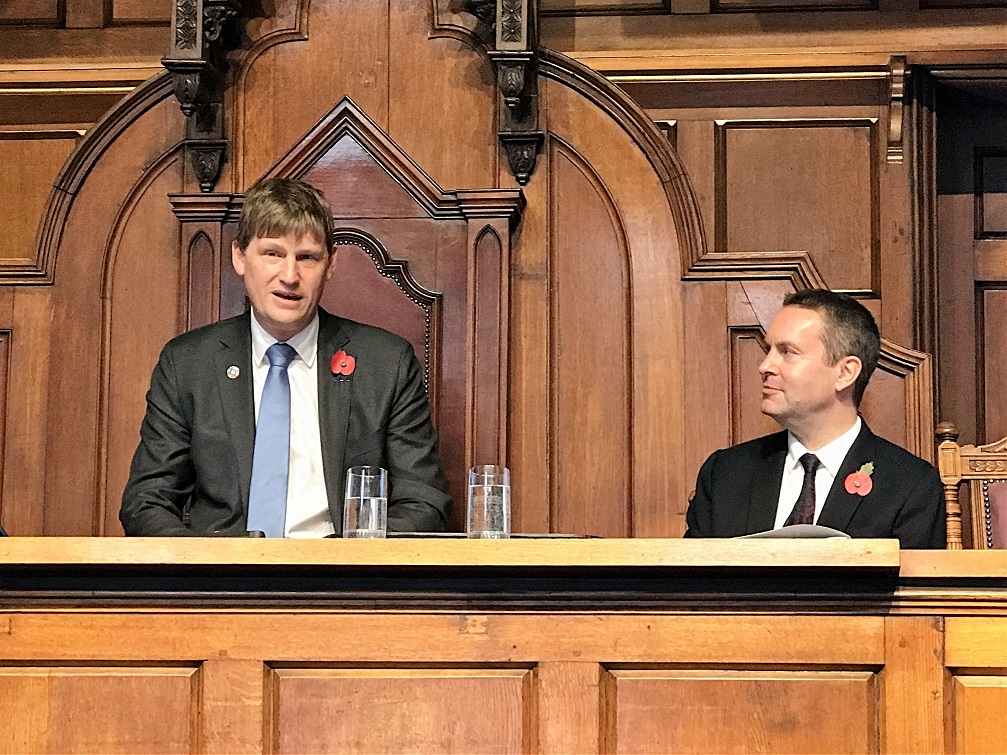One of the UK’s most senior diplomats has praised De Montfort University Leicester (DMU) as a ‘great pioneer’ in sustainability, in a debate with staff and students.
Ambassador Jonathan Allen, the UK’s Deputy Permanent Representative to the United Nations, was quizzed on issues relating to politics and international diplomacy at the latest Be The Change panel discussion.

Ambassador Allen started the event by providing a summary of the current global political and social landscape. He said that we are currently in a period of challenge and change for the UN and it is more important than ever that countries work together and ‘stand up for what they believe in’.
Asked about the practicalities of diplomacy at the UN, Ambassador Allen outlined the workings of the UN at their New York headquarters inside and outside of meetings such as the Security Council.
The first audience question came from PhD student Tom Weir, who asked the Ambassador what he believes is the most important skillset for his role.
“As a diplomat I think the most important things are integrity and trust, you must never lie,” Ambassador Allen responded.
“It is important to be someone of integrity and someone who understands others. As a diplomat you spend a lot of time trying to understand other people’s motivations.”
Another student, Thom Chapman, asked whether we are entering another Cold War, but Ambassador Allen insisted that a similar scenario can be avoided if countries continue to stand up. He pointed out that although the world is now at a complex stage, we are still able to resolve issues through diplomacy.
RELATED NEWS
DMU praised by UN in list of universities promoting the global goals
Students pitch community projects to United Nations delegates
DMU chosen as Global Hub to support United Nations goal for 2030
Brexit was another topic of discussion, with audience members keen to understand how it will change the UK’s position in the UN.
“I think it must have an impact and it has a very simple impact in one way in that as of March 2019 I won’t be going along to the EU delegation for my weekly coordination meeting with the other deputy representatives.
“I hope that going forward it will be a question of working with EU partners. We are leaving the EU but not leaving Europe and our values are not going to change overnight.”
DMU staff member Emily Wallis asked about the role of universities with relation to the UN's Sustainable Development Goals (SDGs), which address global challenges such as hunger, health, education, climate change and social justice, aiming to ensure all people enjoy peace and prosperity by 2030.
Ambassador Allen highlighted examples of research into 3D printing and climate change as examples of real-world impact by universities. He also pointed to the #JoinTogether network of universities, which held an initial conference led by DMU at the UN headquarters in New York in January, as an example of how universities can help to change the world.
He said: “In terms of research and development universities are doing huge things to help the SDGs.
“Universities are a crucial component of civil society. They are made up of people and it is people that makes things happen and make change happen.
“I was really pleased in New York to be talking to a whole bunch of different students from around the world brought together through the #JoinTogether programme to say talk to each other and be curious about other people’s positions and stand up for what you believe in.”
Other audience questions addressed whether the UN is fit for purpose, the ambitions of China, the UK’s response to the Salisbury poisoning and climate change.
Posted on Tuesday 6 November 2018